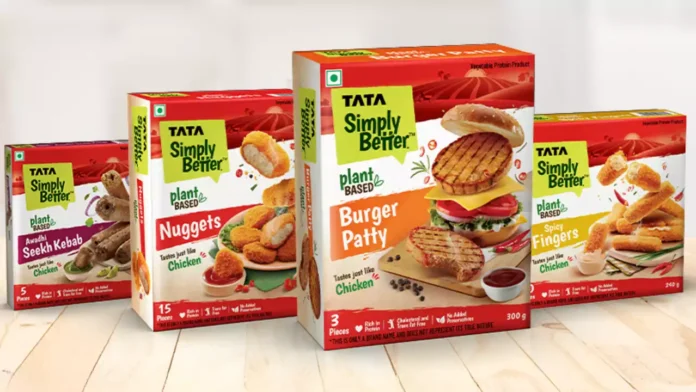ITC Ltd. and Tata Consumer Products Ltd. have opted out of the plant-based meat market, citing a decline in its buzz and economic feasibility. The companies, renowned for their packaged consumer goods, find the niche category insufficiently profitable to sustain operations.
“We introduced plant-based meat anticipating a global trend, but unfortunately, the category hasn’t gained momentum,” explained Sunil D’Souza, managing director and chief executive officer of Tata Consumer Products. Uncertain about future demand, Tata Consumer has chosen to shift its focus from the alternative meat segment to more lucrative categories, such as its millet-based portfolio.
Meanwhile, ITC Ltd. has also discontinued the sale of its plant-based meat products. Consumers will no longer find these vegan alternatives on retail shelves, e-commerce platforms like BigBasket, or ITC’s online store. However, certain variants are still available for institutional purchases.
“The [plant-based meat] sector is still in its early stages and evolving in India,” remarked Ashu Phakey, business head of frozen food at ITC Ltd. “We are keeping a close eye on developments and trends within this segment.”
Continue Exploring: Nestlé India collaborates with SOCIAL and BOSS Burger to debut MAGGI’s plant-based menu across major cities
During the initial months of the Covid-19 pandemic, sales of plant-based meat products, designed to replicate the taste of chicken, experienced a significant surge. Several startups, such as Blue Tribe, Shaka Harry, and Imagine Meats, established themselves in this niche market as plant-based diets gained traction and acceptance in the world’s largest vegetarian nation. This trend was particularly notable among younger consumers residing in major urban centers with relatively high disposable incomes.
Famous personalities have joined the trend of investing in plant-based food companies. For instance, Indian cricketer Virat Kohli and actor Anushka Sharma support Blue Tribe, while MS Dhoni backs Shaka Harry. Bollywood actors Riteish and Genelia Deshmukh are actively promoting Imagine Meats.
The burgeoning trend swiftly attracted the interest of two major fast-moving consumer goods corporations—ITC and Tata Consumer—who joined the market in 2022. ITC introduced meat-free burger patties and nuggets through its Master Chef Incredible brand, while Tata Consumer unveiled vegan versions of seekh kebabs and spicy fingers under the new brand “Tata Simply Better”.
ITC and Tata’s foray into the market ignited optimism among analysts, who foresaw substantial potential. According to a September 2021 report by Nirmal Bang, the plant-based meat market was projected to hit $500 million by 2024. Despite the initial excitement, however, the growth of this innovative category has fallen short of expectations. Statista now anticipates the current market size of $160 million to expand to $260 million by 2027.
Continue Exploring: The Good Food Institute India unveils first comprehensive report on India’s $4.2 Billion smart protein sector
While certain consumers are deterred by the lackluster taste of faux meat, the more worrisome aspect is its price point. To illustrate, a 520-gram pack of ITC’s genuine chicken grill patty is priced at INR 375, whereas its 330-gram vegan burger patty was listed at INR 630. In essence, the plant-based alternative is nearly three times pricier than its animal counterpart.
Some consumers also harbor doubts about whether plant-based meat truly represents a healthier alternative when compared to traditional protein sources such as dairy.
“Considering the plethora of delicious and nutritious protein choices available, why would I resort to processed substitutes?” Maya, 29, who became vegan five years ago, laments her decision. “Even for my mom and dad, who adhere to a vegetarian diet, the idea of plant-based meat holds no fascination whatsoever.”
The tepid reception of the plant-based meat category in India spurred FMCG players to explore beyond this terrain. “However, should the trend resurge tomorrow, we’re prepared to dive in, as we’re among the select few companies in the country equipped with the necessary capabilities, whether in manufacturing or distribution,” stated TCPL’s D’souza.
Weak sales performance in India compelled Beyond Meat, a US-based alternative meat brand, to withdraw from the market merely a year after forging a partnership with the Allana Group in 2022 to distribute its sausages and burgers in the country.
In the meantime, the faux meat industry is experiencing global challenges, with major players like Impossible Foods and Beyond Meat witnessing revenue declines, while smaller counterparts such as Hooray Foods and Nowadays have ceased operations.
Impossible Foods, renowned for its vegan burgers as an alternative to beef hamburgers, intends to undergo a rebranding effort aimed at “enticing the carnivorous appetites of meat eaters,” as stated in a press release issued in March 2024.
Continue Exploring: GFI India study unveils popular choices in plant-based foods: Chicken seekh kabab and soy milk lead the pack in consumer trials
Anand Nagarajan, co-founder and CEO of Shaka Harry, acknowledges that the widespread embrace of plant-based meat in the country has not materialized as rapidly as initially expected. In fact, the only segment demonstrating promising growth potential is dairy alternatives.
“That may be because these products are not marketed optimally,” he remarked.
He emphasized the necessity for vegan meat and plant protein to be contextualized within an Indian framework and narrative. “We cannot simply apply what is used in the West and anticipate widespread adoption. This category must align with our culinary and cultural context.”
The perception of elitism, commonly linked with plant-based alternatives, is deterring numerous consumers. In response, the Bengaluru-based startup has launched a 13-gram plant-based sandwich patty priced at INR 99. Additionally, it has introduced more affordable variants of its plant-based products ranging from INR 99 to INR 199, aiming to appeal to a wider range of consumers.
Nagarajan is hopeful about increasing turnover by 2.5 times in fiscal 2025 compared to the previous year, expressing confidence that the trend of “eating clean” is enduring.



